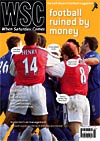 Ian Plenderleith looks into the legal jusitfication for the Premier League and Football League's copyrighting of their fixtures
Ian Plenderleith looks into the legal jusitfication for the Premier League and Football League's copyrighting of their fixtures
Remember the outcry when the Football League and the Premier League began charging websites for publishing their fixture lists? How could the leagues possibly hold the copyright over an item of public information such as a football fixture, many wondered. Although the furore has subsided, the question has never been satisfactorily answered. Meanwhile, the leagues, under their joint venture Football Dataco, have been making money for nothing.
There has been no court challenge on this matter to the leagues. Voluntarily run websites, who often put any profit back into the teams they support in the form of sponsorship, have neither the time nor financial resources to challenge bullying letters they receive from the Premier League and the Football League ordering them to expunge “copyrighted” content from their sites.
Would a legal challenge to this commercial exploitation of information in the public domain succeed? If you look at what constitutes intellectual property on the UK government-backed home of intellectual property on the internet, you might think so. However, according to legal sources, what looks like a clear-cut case to the layperson doesn’t necessarily take into account the inherently ass-like nature of the law.
The site states that IP “allows people to own their creativity and innovation in the same way that they can own physical property”. In what respect does a football fixture list represent creativity and innovation? And when the criteria for copyright – the category of intellectual property under which the leagues claim ownership of the fixture lists – are listed, then the question of whether copyright law applies to the words “Reading v Bristol City” pops up line-by-line.
“There is no copyright in a name, title, slogan or phrase,” says the IP website. Reading and Bristol City are both club names. The “versus” links the two and turns them into the title of the fixture. What else might you call it? A concept? Art?
Well, possibly. Copyright covers “literary and artistic material, music, films, sound recordings and broadcasts, including software and multimedia”. Even on the most generous interpretation by a non-lawyer, it is hard to see how Reading v Bristol City qualifies as “artistic material”. Yet ridiculous as it may seem, according to a London-based lawyer with intellectual property expertise, who asked not be named, the categorisation of the leagues’ fixtures as “artistic material” might actually stand up in court.
“A football fixture list is arguably a ‘literary’ work for the purposes of the Copyright Designs & Patents Act 1988,” he told WSC. “The Act does not require artistic merit in a ‘literary’ work, merely some effort in generating it.” He adds too that databases are protected by copyright, and the football fixtures are arguably recorded using a type of database.
Back to the IP website: “A work can only be original if it is the result of independent creative effort.” Presumably the fixtures result from the clubs informing the leagues that they will be entering their respective competitions in the coming season. Thus, Reading v Bristol City will automatically appear somewhere on the fixtures. Or do Dataco executives sit around creatively bouncing “ideas” off each other: “Hey, how about Reading v Bristol City on November 10 next season?”
Still, what the person in the street sees as logical can be interpreted differently by the law, as we have seen above. But the IP lawyer at least holds out some hope that a legal challenge would be successful when he says that while football fixtures are “arguably” protected by copyright, it may be possible to reproduce them without the permission of Dataco by citing the Fair Dealing exemption in the Copyright Act.
“This allows fair use of material for the purposes of criticism and review and, more relevantly here, the reporting of current events. However, you still have to obtain the fixtures in the first place,” he cautions. Or, as the fixtures will be available somewhere (unless Dataco keeps them locked in a safe), you could just copy them from a newspaper or website.
Dataco, meanwhile, has been using its creativity and innovation to justify, for example, a charge of £500 plus VAT for a licence to the unofficial website of a Premier League club merely so that it can publish its own club’s fixtures for a single season. They believe such charges are only fair.
“Traditionally newspapers have made a lot of money by selling a lot of extra copies off the back of printing the new season’s fixture list, thus it was only right that football should get its share of this,” Dataco’s general manager, David Folker, said. This also applies to the internet, he argues. But the crux of the matter is, if no one knew about the games, who would go? Just Dataco employees?
It’s hard to avoid the impression that a body calling itself Dataco will not stop at copyrighting fixtures. What else might it claim as its own to cherish and charge for? Historical stats, match stats, player stats? The commercial possibilities must be causing Mr Folker and his colleagues to explore all manner of new literary and artistic material. Meanwhile, the game will continue to be plundered further by its governing bodies, right down to its last fixture and fitting.
From WSC 181 March 2002. What was happening this month
Here's a bit more legal comment: http://the1709blog.blogspot.com/2010/04/football-match-lists-copyright-penalty.html